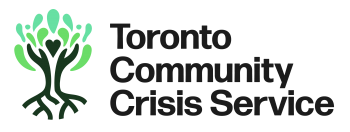
The Toronto Community Crisis Service (TCCS) provides free, confidential, in-person mental health supports city-wide from mobile crisis worker teams. TCCS supports Toronto residents 16 years of age or older and is available 24 hours a day, seven days a week.
The service provides a non-police-led, community-based, client focused, and trauma-informed response to mental health crisis calls and wellness checks. A trauma informed approach promotes healing and recovery and takes into account a client’s life experiences.
TCCS also provides:
